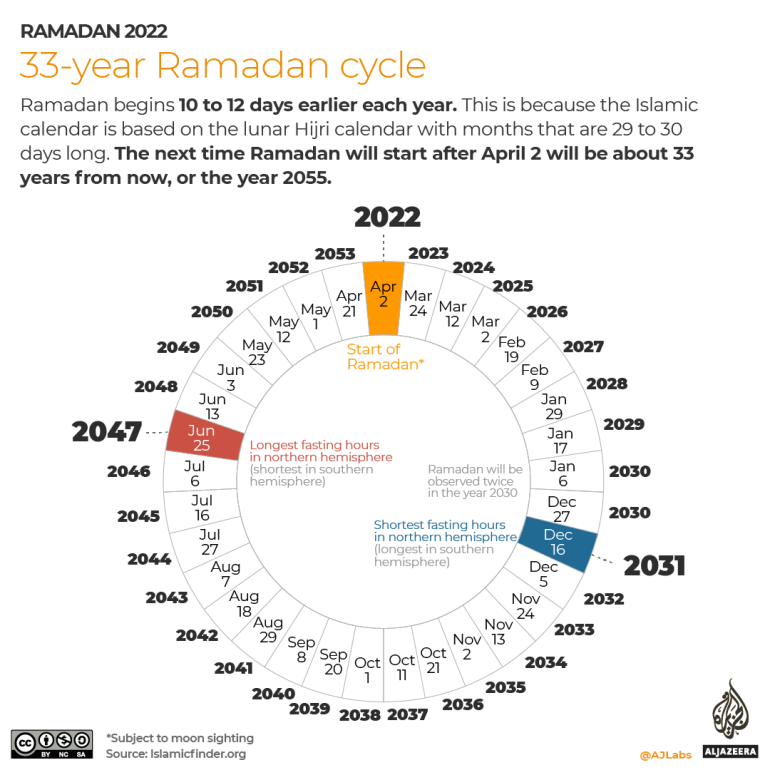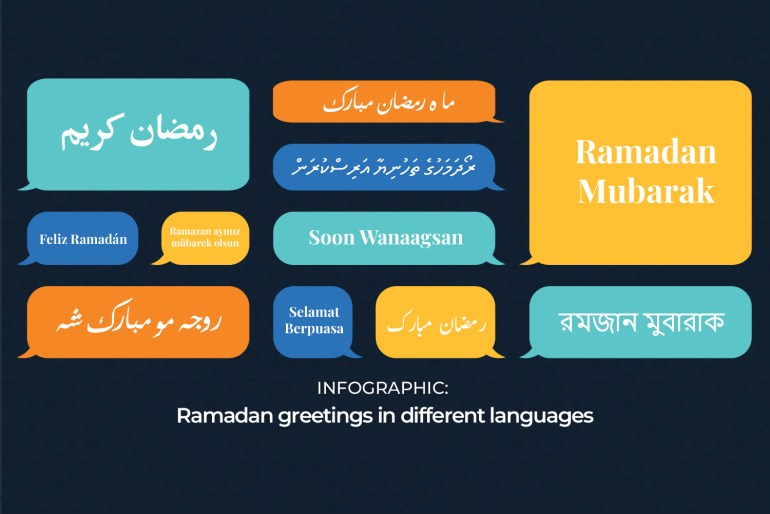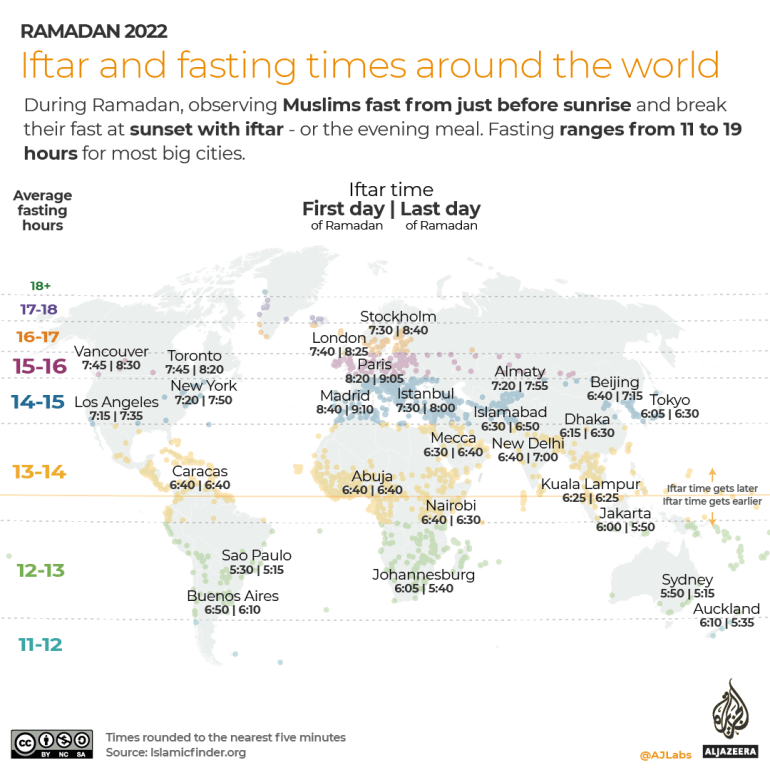[ad_1]
The Muslim holy month of Ramadan is upon us and folks internationally are fasting in addition to spending a lot of their time considering and praying. For a lot of, will probably be the primary Ramadan for the reason that pandemic started after they can deliver household and buddies into their houses to share within the breaking of the quick. However there will even be an air of disappointment for these whose houses have skilled the lack of family members to COVID-19; for them, prayers will probably be much more vital.
Throughout Ramadan, grownup Muslims who observe the quick are to not eat or drink from dawn to sundown. In fact, the size of time an individual fasts for varies relying on the place on the earth they reside as day size is ruled by the point of 12 months and the gap one is from the equator. Some individuals are additionally exempt from fasting, like youngsters, the aged, these whose well being is more likely to be compromised by abstaining from foods and drinks, and menstruating and pregnant girls; they’ve the choice of donating cash to charitable organisations in its place.
Fasting, typically, has been proven to have well being advantages, with intermittent fasting changing into a preferred method to reduce weight. Quite than give attention to what to eat, intermittent fasting tells you when to eat. It entails fasting for a sure variety of hours every day (often between eight and 16, any longer than this may be harmful), reflecting the best way people possible ate throughout their hunter/gatherer years earlier than they discovered to farm.
The concept is that when your physique has used up its sugar shops, it begins to burn fats, and weight reduction happens – a course of generally known as metabolic switching. Research have proven that the well being advantages that may be incurred by means of intermittent fasting embrace decrease blood strain and ldl cholesterol, total lowered irritation, higher responses to insulin and lowered danger of kind 2 diabetes. There may be additionally proof that intermittent fasting can assist enhance our long-term reminiscence, cut back the chance of sure cancers and decelerate the indicators of ageing.
However for Muslims, the well being advantages are secondary, and the aim of the quick, which is among the 5 pillars of Islam, is to deliver them nearer to God, give thanks and mirror on the teachings of the Quran. Some individuals could discover fasting simple however for others, it may be a problem and starvation can get in the best way of labor and different every day actions. So, are there methods to stave off a few of these starvation pangs?
The reply is, sure; sure meals eaten earlier than commencing a quick can assist cut back your starvation whereas sustaining your well being – it’s only a case of understanding what to eat.

Suhoor: Fibre, protein, carbs
If you’re fasting, don’t skip suhoor, the morning meal earlier than the quick begins. Consuming the suitable meals at this level is vital in serving to to scale back cravings later within the day.
Breakfasts have a tendency to incorporate carbohydrate-rich toast or sugary cereals, however these will solely trigger a glucose spike in your blood, adopted by a dip because the sugar is damaged down. This may activate the cravings centre in your mind telling you that extra meals is required. So as an alternative, go for a fibre and protein-rich suhoor meal.
Fibre is vital in slowing down digestion and protecting you feeling full. It’s thought to extend the quantity of short-chain fatty acids in your intestine. These assist promote a sense of fullness with some research exhibiting fibre from sources reminiscent of beans, peas and chickpeas can improve your emotions of fullness by 31 %. For breakfast, take into consideration cooking up some mushrooms, avocados, greens, pulses or nuts to assist maintain these starvation pangs at bay.
Protein also needs to be an vital element of your suhoor meal. It might really feel odd however going for meals excessive in protein reminiscent of lean meats like baked fish or rooster is an effective method to maintain from being hungry later within the day; alternatively, you may strive boiled or poached eggs or vegan protein sources together with lentils or chickpeas. Research have proven that protein-rich meals maintain you fuller for longer and cut back starvation hormones in contrast with sugary or carbohydrate-rich breakfasts. So, alongside your fibre, have a very good chunk of protein to maintain you much less hungry as your quick progresses.
Carbohydrates are a key element of most meals, however they do trigger sugar spikes and insulin ranges to extend which might make you hungry in a while. You wouldn’t have to keep away from them fully, nonetheless. As an alternative, take a look at while you eat carbohydrates throughout your meal. Research present that consuming carbohydrates after your fibre and protein can cut back glucose and insulin spikes in your blood. The fibre will coat your intestines and mix with the protein. Meals will then transfer extra slowly by means of the intestine and fewer glucose from the remainder of the meal will probably be absorbed. This implies feeling fuller for longer, curbed cravings and higher hormonal stability.
So one of the simplest ways to get pleasure from a suhoor meal is to get your fibre first, adopted by proteins and fat, then save your carbohydrates reminiscent of toast or paratha till the top. You might be tempted to eat all of them collectively however the order during which you eat your meals has been proven to be vital in balancing your starvation later within the day – give it a go.
Hydration: Advantages of plain water
Don’t forget to hydrate.
There may be some analysis to point out that consuming water can assist us from feeling hungry. One small examine discovered that individuals who drank two glasses of water instantly earlier than a meal ate 22 % lower than those that didn’t. It confirmed that consuming water earlier than consuming can stretch the abdomen and ship fullness alerts to the mind.
Attempt consuming a glass of water earlier than and after your meal. There may be nonetheless loads to be understood about how water may curb starvation cravings, however dehydration throughout the fasting durations in Ramadan is an actual concern and the neurones that govern thirst and starvation are intently associated.
Keep in mind that though tea and low include water, the caffeine content material in them can act as a diuretic and make you go extra urine, which might add to the dehydration results of fasting, so it’s best to go for the good things: plain water.

Iftar: What to eat when breaking your quick
The meals we break the quick with is equally vital.
Historically, Muslims break the quick at sundown with the consumption of a date; these are sugar-rich and are absorbed rapidly by the physique, giving it an nearly immediate increase. Following this, attempt to cut up the iftar meal into two, fairly than consuming one giant meal. This may assist handle a big blood glucose spike, in addition to cut back the chance of indigestion.
Take into consideration a broth or soup starter, taking a break for prayers after which coming again to a extra substantial meal made up of complicated carbohydrates, proteins and fibre-rich greens. Balancing meals on this means will imply you’ll really feel much less bloated and lowered glucose/insulin spikes imply you’ll have extra vitality total. Plus the protein and fibre in your meal will maintain you fuller for longer and you’ll not end up drifting again to the kitchen for snacks later.
Ramadan can play havoc with our sleep routines. Waking up early for suhoor after which praying tarawih late into the night time can imply we’ve much less time for sleep. Many people should work throughout Ramadan too, so can not have a lie-in. Attempt to prioritise sleep in your days off from work, getting sufficient good high quality sleep can cut back emotions of starvation by lowering ranges of our starvation hormone, ghrelin, and growing ranges of the appetite-regulating hormone, leptin.
On the times that it’s attainable to take action, intention to return to sleep after the fajr prayer and get a complete of eight to 10 hours of sleep per night time; it is not going to solely assist together with your ranges of starvation but in addition your basic wellbeing.

COVID-19 and fasting
You will need to keep in mind that we’re nonetheless in a pandemic and ranges of COVID-19 stay excessive in lots of nations, pushed by the BA.2 subvariant of Omicron which is proving to be extremely contagious. Though it’s thought to have milder signs than Delta, an individual’s response to the virus is unpredictable and the sheer variety of individuals changing into contaminated means we’re once more seeing an increase in hospitalisations due to COVID.
Crowded mosques are a great breeding floor for the virus, as individuals are in shut proximity to at least one one other and plenty of buildings are sometimes poorly ventilated, which means an airborne virus reminiscent of SARS-CoV-2 can go between individuals simply. Bear in mind, if in case you have any signs of COVID, then it is best to do a check and never go to the mosque to hope while you’re awaiting the outcomes or whether it is optimistic.
The signs of Omicron overlap with these of the frequent chilly, so sore throats, complications and runny noses ought to be handled as suspected COVID till confirmed in any other case by means of a check.
These answerable for mosques have to adapt and take a look at ventilating their buildings correctly, this may imply investing in authorised air filters or guaranteeing home windows and doorways stay open in order that air strikes by means of the constructing effectively. Contemplate carrying a masks to the mosque. Most of us are used to carrying masks in public indoor areas and the mosque ought to be no completely different. Bringing your individual prayer mat and performing the ablution at residence will additional assist cut back your danger of contracting COVID.
If you’re clinically extraordinarily weak, take into account praying at residence, fairly than danger mixing with giant teams of strangers who could also be carrying the virus. And naturally, be updated with the vaccines, they’re the perfect and most secure method to cut back your danger of getting critically sick from the virus. With a purpose to quick for the whole thing of Ramadan, it’s important to stay nicely – and these easy measures will allow you to achieve this.
Fasting and different well being points
For many who have long-term well being situations, you might be exempt from fasting however in my expertise treating sufferers, I do know some should still select to try to quick. Bear in mind to debate this together with your doctor first; you need to not immediately cease your medicine and even altering the timings of your medicine can have antagonistic results in your well being. Individuals with kind 2 diabetes who’re on glucose-lowering medicine could undergo from dangerously low blood sugar ranges in the event that they quick, so it’s vital that they focus on this with their physician.
Though exempt, many pregnant Muslim girls additionally partake within the every day quick throughout Ramadan. As a health care provider, I’d advise towards this. Extra research are wanted to analyze the consequences of fasting on being pregnant outcomes, however one giant systematic evaluate discovered that though it had no vital impact on delivery weight or stillbirths, there was proof the placenta – the important organ that transports meals and oxygen to the creating child – was lighter in weight in fasting moms than those that weren’t fasting. Being pregnant exempts girls from fasting for good purpose, and it’s best to stay to the foundations put down by Islam in terms of this.
Exercising throughout Ramadan may be completed safely, offering you don’t push your self. This isn’t the time to construct muscle or endurance, the main target ought to be on sustaining health ranges. It’s possible you’ll fatigue simply throughout a quick and there may be an elevated danger of dehydration. Be sure you drink loads of water at suhoor and iftar and eat fruit and greens which have loads of water locked inside them.
Keep away from caffeine or salt-rich meals and drinks throughout your consuming hours as these will solely serve to dehydrate you in a while. For those who can, train after the quick has been damaged so you may drink whilst you work out. If that isn’t attainable, exercising simply earlier than the breaking of the quick is the following neatest thing as you may drink and rehydrate quickly after. It’s best to keep away from exercising in excessive temperatures or within the solar for too lengthy. Bear in mind, you might be fasting and scaling again on train or taking extra relaxation days will not be a foul factor throughout Ramadan.
Whereas fasting has been proven to have some well being advantages, what you do on both aspect of your quick is equally vital to sustaining good well being. Ramadan is about reflection and self-discipline in addition to breaking dangerous habits, and if we are able to all eat a bit extra healthily and extra mindfully and carry this all year long, this will solely be a very good factor.
[ad_2]










Leave a Reply